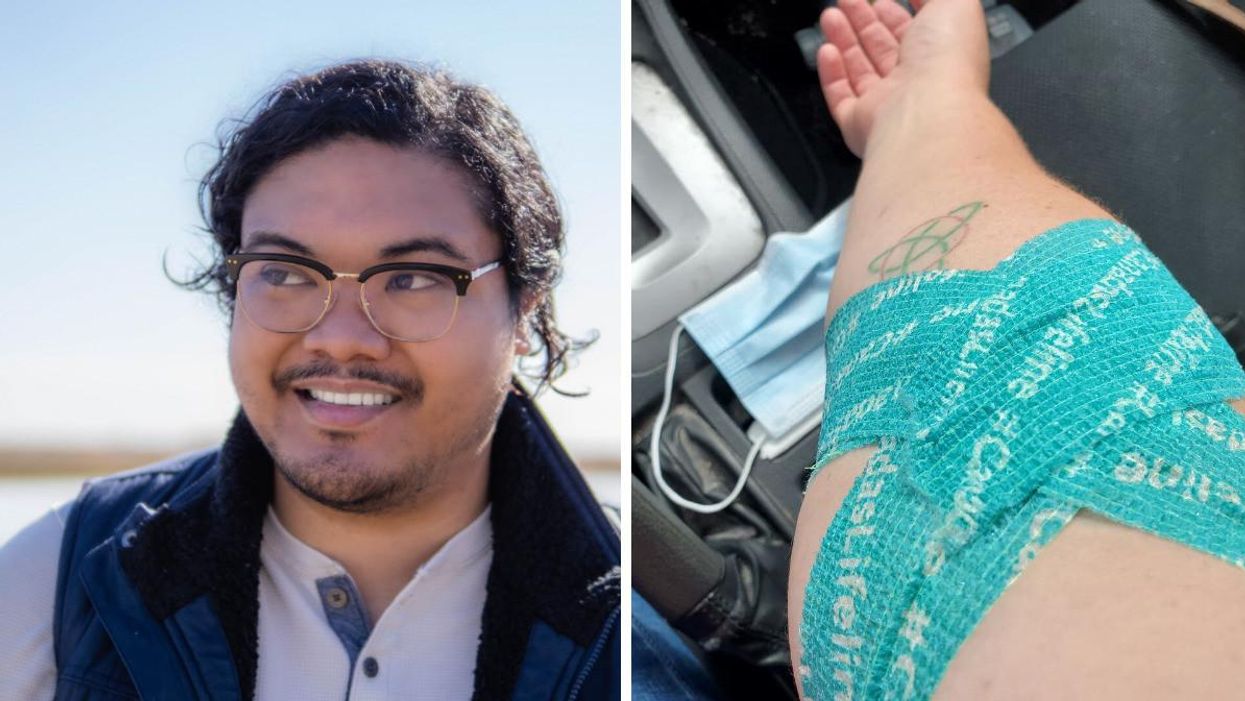More People Can Donate Plasma In Canada Now & This Man’s Story Proves Why That’s So Important
Regulations are starting to change.
For Canadians, it can feel like historic moments are happening every day, and here's another one.
A community of Canadians is being allowed to become plasma donors more easily after decades of being turned away.
Last September, Canadian Blood Services launched a pilot program in Calgary, Alberta, and London, Ontario, to enable men who have sex with men to donate plasma more easily.
In these cities, men can donate plasma if they haven’t had a new male partner in the last three months, and if they and their partner have only had sex with each other.
Since the 1980s, sexually active gay, bisexual and other men who have sex with men (gbMSM) haven’t been able to donate blood, platelets or plasma.
This policy was based on the overall rate of HIV being higher among gbMSM than the general population, but it didn’t take into consideration individual risk factors.
That’s one of the reasons why, in December 2021, Canadian Blood Services made a submission to Health Canada recommending a new way of screening donors.
This way takes into account higher-risk sexual behaviour for all donors, regardless of their gender or sexual orientation, and for all blood products.
The plasma-donation program in London and Calgary is an interim step.
For people like Glenndl Miguel, a Calgary-based paramedic, the change in Calgary and London is a pretty big deal.
"I think as part of the gay community, a lot of us have the desire to be charitable, we just never were allowed to," Glenndl told Narcity.
"It’s nice to see the change that we’re taking steps forward to make it more equal and to make it more fair to all the people who want to be a part of the system."
The program couldn't have come at a better time either. Canadian Blood Services told Narcity that the need for plasma is more than four times greater than what's donated.
While there are still some restrictions on eligibility, the recent change is a big step that expands the pool of potential donors.
Donated plasma is used in treatment to treat many diseases, including clotting disorders, burns and immunodeficiency conditions, and it could take over 100 plasma donations to help one patient for a year.
Glenndl has firsthand experience of the importance of plasma donations, as both a health-care professional and as a donor.
"I’ve seen that in my job, I’ve seen how that can save lives. One person can make that difference," he said.
"With just even an hour of your time, you can give someone an extra decade in their life."
Glenndl started donating blood when he was 18, but he wasn't able to after he entered a relationship.
He's been an advocate for change in the medical community throughout his career, and he was quick to sign up when the eligibility for donors expanded in his city.
"I figured it would be a nice thing to get back into, because it was something I was particularly passionate about before I was unable to do it," he said.
Participating in the program held a lot of meaning for Glenndl.
"It’s got a bitter-sweet feeling for me, for someone who is both a gay man and someone who uses these things in medicine," he said. He went on to say that it’s unfortunate that people were ever excluded from donating based on sexuality.
“It’s part of the system that uses [sexuality] to prevent others, like myself and other people, […] from doing something altruistic and doing something charitable, like giving a piece of themselves to help someone else.”
Glenndl described his recent donation experience as "inclusive." He sees the plasma program as a leap forward and encourages people of all backgrounds to donate if they have the opportunity to do so.
At the same time, Glenndl knows that more needs to be done to create equal opportunities for donors.
"There’s still a ways to go and we still want to see a full-on lifting of any kind of ban and discrimination policy," he said.
"Whether you’re gay straight white or black, you know, whoever you may love, whoever you may spend your time with [...] blood is very important, and blood is blood and it doesn’t discriminate."
Whether you're newly able to donate plasma or you've been thinking about it for a while, you can see if you're eligible to donate and book an appointment at your nearest Canadian Blood Services location.
For more information on donating plasma, visit expandingplasma.ca or Canadian Blood Services. You can also follow them on Instagram, Facebook, Twitter, and YouTube.
This interview has been condensed and edited for clarity.
The information in this article is not intended and should not be construed as medical advice. Consult your health care provider before making any health care decisions or for guidance about a specific medical condition.

